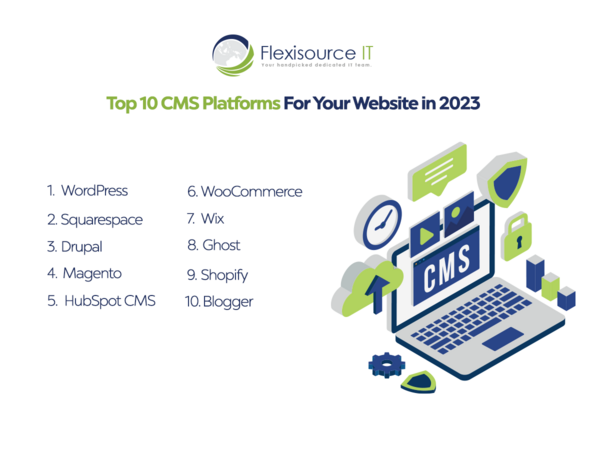Building and managing a website is not easy. There are certain aspects you need to acquire and learn, like programming languages, website hosting, and tools, before developing a website from scratch. This would be challenging for a beginner, especially if you are not a web developer.
But did you know that creating and maintaining a website is more straightforward with CMS? The right CMS platform will help your business achieve your website goals without learning the hard development stuff.
There are tons of CMS platforms in the market today. Features and functions differ per CMS, so you might want to choose the tool that best fits your needs and budget. And to help you with that, we listed 10 CMS platforms in this article!
Table of Contents
What is Content Management System (CMS)?
Content management systems (CMS) are website platforms that provide a centralized database for storing, organizing, and editing website content. These systems are used by organizations and individuals to manage the content, format, design, and layout of a website, its web pages, and blogs.
The benefits of CMS are that it allows for an easier way to manage content, reducing the time editors spend on updating and editing content. This is because CMSs allow users to correct or edit pages through a centralized interface without going through each page individually.
Top 10 CMS Platforms for Your Website
There are many various types of CMS systems developers can choose from. Some are free and open source, while others are commercial products. Here are some of the best CMS in 2023 that most businesses and developers use.

1. WordPress
WordPress is a free, open-source CMS platform and blogging tool. It has the largest share of web traffic, with over 60 million websites using it as their publishing platform. It’s also the most popular website hosting service operated by bloggers.
Matt Mullenweg originally released this CMS on May 27, 2003, as a b2/cafe log fork. The software is maintained by the WordPress Foundation and developed collaboratively by thousands of contributors from around the world.
Likewise, WordPress offers a pretty amazing to its users. It’s powerful and easy to use, so you can create your beautiful website or blog in minutes. WordPress is also one of the utmost adaptable, giving you complete control over design, functionality, and more.
Suppose you want to take advantage of some of its premium features, like a custom domain name or web hosting by WordPress.com VIPs. In that case, you’ll need to pay for a WordPress plan from WordPress.com or find a third-party host provider that offers these features for an additional fee.
2. Squarespace
Squarespace is a website builder and CMS platform that allows users to create and maintain their own websites.
This CMS has many features and tools that can be used to create a professional website for your company. It is known for its clean, straightforward design and Drag and Drops Interface. This makes it easy to use for people with little-to-no experience creating websites.
Moreover, users can use the site’s templates or customize them with their own images, colors, fonts, etc. It has other features such as custom URLs, SEO Tools, Live Website Builder, and Site Analytics. This CMS also includes an eCommerce solution so that users can sell products online without learning to code.
3. Drupal
Drupal is a free, open-source content management framework that allows users to create and manage various websites. It can be used to make dynamic websites through PHP scripting language and MySQL databases for its operation.
Likewise, this CMF was initially written by Dries Buytaert as an academic project in 2000 but became famous when it was released as open-source software in 2001. Today, the Drupal community consists of tens of thousands of people worldwide who have translated the software into over 100 languages and created over 50 thousand modules for use on Drupal websites.
4. Magento
Magento is an open-source eCommerce CMS that allows you to build and run online stores of any size. It has been around since 2007 and was created initially by Varien Inc, but it is now owned by eBay Inc.
Likewise, this CMS platform is used by more than 240,000 online stores. It is one of the world’s most popular eCommerce platforms and powers more than 80% of all online stores.
Magento has a lot to offer as an eCommerce platform. It provides much flexibility in layout and design, and it’s easy to integrate with third-party services. It also has advanced features like SEO optimization and mobile-friendly design. Magento also includes a flexible catalog, powerful search, content management system, and more. Magento is also known for its scalability and reliability.
5. HubSpot CMS
The HubSpot CMS is an open-source Content Management System (CMS) Platform that offers many features to its users. It has a user-friendly interface and is compatible with most web browsers. This CMS platform also has a lot of plugins available for different purposes.
The main reason why HubSpot CMS is so popular among small business owners is that it has inbuilt marketing tools. It helps them manage their digital marketing efforts more effectively. Users can use the HubSpot CMS to create blogs and pages, work on their social media accounts, schedule posts and monitor their content performance. They can also export their data in different formats, such as PDF or CSV files.
6. WooCommerce
WooCommerce is a free, open-source eCommerce platform that allows you to sell anything online. It’s one of the world’s most popular and widely used eCommerce platforms and has been translated into more than 60 languages.
This CMS Platform is designed for small to large businesses. It has many unavailable features on other platforms such as Magento or Shopify. These features include creating products, managing orders, processing payments, and more. It also has CMS functions such as SEO integration, Mobile Access, Data Security, Email Marketing, and more.
7. Wix
Wix is a CMS platform and website builder that lets users make their own websites without coding skills. This CMS platform was developed in 2006 by Israeli developers Nadav Abrahami, Avishai Abrahami, and Giora Kaplan.
It offers a variety of templates that you can use to create your website. These templates are divided into business, Creative, Personal, and eCommerce. Users can modify these website templates by adding text, images, and videos.
8. Ghost
Ghost is a free and open-source blogging platform. It is a content management system created in 2013 as an alternative to WordPress. To date, it is used by more than 100k websites, including Unsplash.com, Duolingo.com, Codeacedemy.com, and more
This CMS Platform offers a simple, elegant interface that can be customized through themes and plugins. It’s designed for speed, security, and scalability. Moreover, Ghost’s SEO tools are wide-ranging for basic on-page SEO but with less extensive complexity.
9. Shopify
Shopify is a leading and one of the best eCommerce platforms that offer a variety of tools and services to help entrepreneurs start, grow, and manage their online stores. It offers everything from simple templates to more advanced features like custom domains, point-of-sale software, and sales analytics.
Shopify’s mission is to empower entrepreneurs by helping them start, grow, and manage their own businesses. As such, this CMS provides everything an entrepreneur needs to set up an online store: stylish themes for any type of business; powerful eCommerce software; the ability to securely accept payments with just a few clicks; and access to expert advice through video tutorials or live chat with other entrepreneurs.
10. Blogger
Blogger CMS is a platform that allows you to create and maintain blogs. It is free and open-source software. Blogger.com is a blogging platform owned by Google and was launched on March 27, 1999.
It has recently become popular with bloggers because it’s easy to use and requires no programming skills for customization or updates. This means less time spent on blog maintenance for bloggers who want to focus on their writing instead of technicalities.
Blogger.com’s primary focus is to provide a user-friendly interface for bloggers to easily publish content on the internet.
Choose your CMS with us!
There is no best CMS platform in the digital world where everything is ever-changing and fast-paced. Everything varies, and most offer unique benefits to their users. Likewise, you must pick the best platform that suits your website.
The ideal CMS platform should be able to help you manage your website, be easy to use for your teammates, and enable you to create a dynamic and perfect website. These 10 CMS platforms are just a few that you can pick from.
Make sure to research and look for user reviews before choosing and investing in one. But if you can’t choose, Flexisource IT can help you! We have the best website development service in Australia and New Zealand. Contact us now!
Pamela is a full-time content writer and a lifelong Philomath. Her previous experience as a research analyst made her passionate about traveling the world and understanding how it works. During her day off, you can often find her indoors, writing stories or oil painting.


